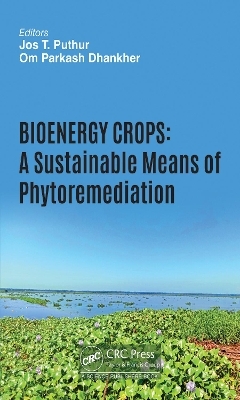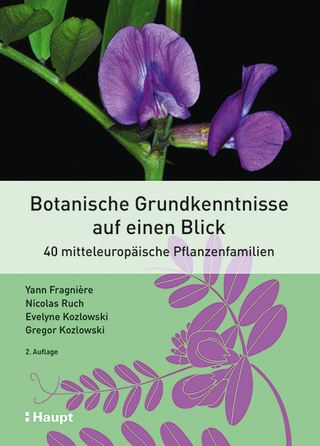
Bioenergy Crops
CRC Press (Verlag)
978-0-367-48913-7 (ISBN)
Key Features:
• Presents dual aspects of hyperaccumulators in phytoremediation and bioenergy production.
• Highlights the future face of industries in phytoremediation and bioenergy production.
• Focuses the promising candidates exploits as hyperaccumulator and biomass producers.
• Explains the role of algae and microbes in bioremediation and bioenergy production.
• Represents a comprehensive, up-to-date analysis in the field of phytoremediation as well as bioenergy production.
Dr. Jos T. Puthur, Professor in the Department of Botany, University of Calicut, Malappuram, Kerala, India, is an eminent plant physiologist and expert in the area of ‘osmoregulation, biochemical and molecular responses, as well as alterations in photosynthetic processes of plants exposed to abiotic stresses’. He was awarded with TWAS research grant for promising scientific research projects, BOYSCAST fellowship of DST, Govt. of India, UGC Fellowship under Indo-Hungarian Educational Exchange programme, and TWAS-UNESCO Associate ship at centers of Excellence in South (CEFOBI, Rosario, Argentina). He is a faculty member of the massive online open course (MOOC) of Consortium for Educational Communication (CEC), MHRD, Govt of India. He was selected as a visiting scientist under INSADFG programme of International Scientific Collaboration and Exchange of Scientists to Institut für Molekulare Physiologie und Biotechnologie der Pflanzen (IMBIO), University of Bonn, Germany. He was a Visiting Scientist at the Institute of Plant Biology, Biological Research Centre, Hungarian Academy of Sciences, Hungary. He has guided 10 students for Ph.D. and published 100 research publications in well reputed national and international journals. Dr. Om Parkash Dhankher, Professor of Agriculture Biotechnology in the Stockbridge School of Agriculture, University of Massachusetts, Amherst (U.S.A) received his M.Sc. and M. Phil. in Botany from Kurukshetra University (India) and Ph.D. in Plant Molecular Biology from Durham University (United Kingdom). He was the recipient of the prestigious Commonwealth Scholarship by the Commonwealth Commission London. He developed the first transgenic plant-based approach for arsenic phytoremediation by combining the expression of two bacterial genes and translating this research from model plant Arabidopsis to high biomass non-food field crops. His major research focus is phytoremediation, bio-energy production, and developing climate-resilient crops. Along with this, his laboratory is developing arsenic-free and arsenic tolerant food crops in order to improve human health using both forward and reverse genetic approaches. Prof. Dhankher has published more than 100 referred publications and book chapters in high impact journals including Nature, Nature Biotechnology, PNAS, Plant Cell, Plant Biotechnology, New Phytologist, Plant Physiology, Environmental Science & Technology, etc., three edited books, guest edited five special issues for several journals, and six international patents were awarded to him. He is an elected fellow of Indian Society of Plant Physiology and a member of the executive committee of the American Society of Plant Biologists (ASPB), and was elected as the Vice President for the International Society for Phytotechnologies (IPS, 2015-2022). Prof. Dhankher is also serving as the senior associate editor for the International Journal of Phytoremediation, editor for the International Journal of Plant & Environment; Plant Physiology Reports, and the associate editor for the Crop Science, Plants, and the Food and Energy Security journal, etc. He has supervised over two dozen Ph.D. and M.Sc. students, and postdoctoral research associates. Prof. Dhankher has established widespread national and international collaborations with researchers in Australia, India, China, Italy, Egypt, U.K., and USA.
1. Bioenergy Plants: A Sustainable Solution for Heavy Metal Phytoremediation 2. Organic Contaminants and Phytoremediation: A Critical Appraisal 3. Bioremediation: Plants and Microbes for Restoration of Heavy Metal Contaminated Soils 4. Phytoremediation Potential of Non-Edible Biofuel Plants: Physic Nut (Jatropha curcas), Castor Bean (Ricinus communis) and Water Hyacinth (Eichhornia crassipes) 5. Water Hyacinth: A Potent Source for Phytoremediation and Biofuel Production 6. Algae: Source of Biofuel and Phytoremediation 7. Biomass Production and Energetic Valorization in Constructed Wetlands 8. Wastewater Remediation and Biomass Production: A Hybrid Technology to Remove Pollutants 9. Waste to Bioenergy: A Sustainable Approach 10. Reclamation and Phytoremediation of Heavy Metal Contaminated Land 11. Global Perspective and Challenges in Utilization of Bioenergy Crops for Phytoremediation 12. Bioenergy through Bioelectricity in an Integrated Bioreactor-Bioelectricity Generator System for Phenol Biodegradation 13. Phytoextraction of Potentially Toxic Elements from Wastewater Solids and Willow Ash – Experiences with Energy Willow (Salix triandra x S. viminalis ‘Inger’) 14. Bioremediation of Wasteland Using Hydrocarbon Yielding Plant: A Case Study
| Erscheinungsdatum | 23.05.2022 |
|---|---|
| Zusatzinfo | 35 Tables, black and white; 2 Line drawings, color; 17 Line drawings, black and white; 6 Halftones, color; 11 Halftones, black and white; 8 Illustrations, color; 28 Illustrations, black and white |
| Verlagsort | London |
| Sprache | englisch |
| Maße | 156 x 234 mm |
| Gewicht | 576 g |
| Themenwelt | Naturwissenschaften ► Biologie ► Botanik |
| Technik ► Elektrotechnik / Energietechnik | |
| Weitere Fachgebiete ► Land- / Forstwirtschaft / Fischerei | |
| ISBN-10 | 0-367-48913-9 / 0367489139 |
| ISBN-13 | 978-0-367-48913-7 / 9780367489137 |
| Zustand | Neuware |
| Informationen gemäß Produktsicherheitsverordnung (GPSR) | |
| Haben Sie eine Frage zum Produkt? |
aus dem Bereich


